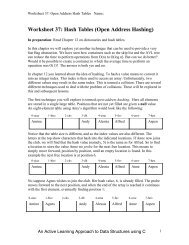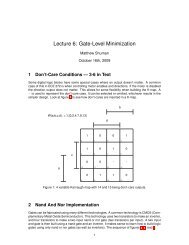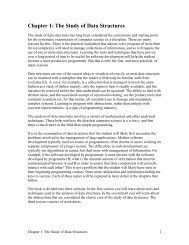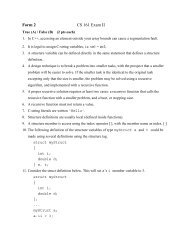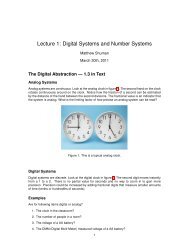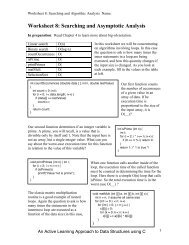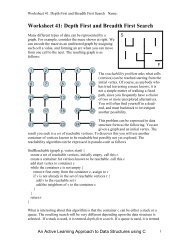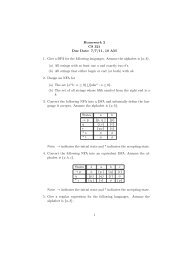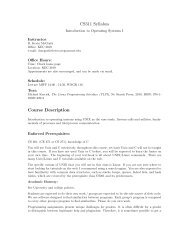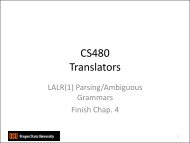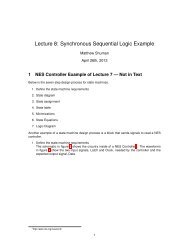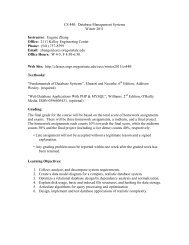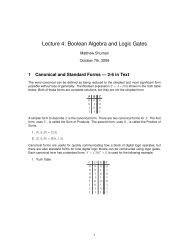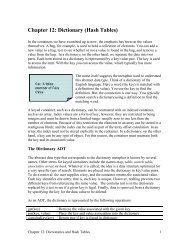Engineering Education and the Development of Expertise - Classes
Engineering Education and the Development of Expertise - Classes
Engineering Education and the Development of Expertise - Classes
You also want an ePaper? Increase the reach of your titles
YUMPU automatically turns print PDFs into web optimized ePapers that Google loves.
100 (January 2011) 1 Journal <strong>of</strong> <strong>Engineering</strong> <strong>Education</strong><br />
had to submit individual lab reports that explained <strong>the</strong>ir findings <strong>and</strong> made recommendations<br />
for <strong>the</strong> astronaut’s diet. The experience in <strong>the</strong> remainder <strong>of</strong> <strong>the</strong> course such as lectures,<br />
exams, <strong>and</strong> homework, was identical between <strong>the</strong> two groups with one exception. In<br />
<strong>the</strong> third round <strong>of</strong> data collection, <strong>the</strong> students in <strong>the</strong> inquiry-based group received a short<br />
homework assignment designed to prompt reflection on some key issues after completing<br />
<strong>the</strong> pre-lab.<br />
During <strong>the</strong> pre-lab discussion for <strong>the</strong> inquiry-based group, <strong>the</strong> instructor used guided<br />
discussion to allow <strong>the</strong> students to discover <strong>and</strong>/or recall <strong>the</strong> key content knowledge required<br />
to answer <strong>the</strong> challenge question on <strong>the</strong> astronaut’s diet. The discussion led students<br />
to discover <strong>and</strong>/or recall key concepts <strong>and</strong> <strong>the</strong>ory. At <strong>the</strong> end <strong>of</strong> <strong>the</strong> pre-lab, students received<br />
a h<strong>and</strong>out summarizing <strong>the</strong> key points <strong>of</strong> <strong>the</strong> discussion. The h<strong>and</strong>out was prepared<br />
ahead <strong>of</strong> time because <strong>the</strong> instructor guided <strong>the</strong> discussion to ensure that <strong>the</strong> required information<br />
arose from <strong>the</strong> discussion. In contrast, <strong>the</strong> control group received <strong>the</strong> h<strong>and</strong>out at<br />
<strong>the</strong> beginning <strong>of</strong> <strong>the</strong> pre-lab <strong>and</strong> followed along as <strong>the</strong> instructor exp<strong>and</strong>ed upon <strong>and</strong> explained<br />
<strong>the</strong> h<strong>and</strong>out.<br />
During <strong>the</strong> lab session students in both groups had access to <strong>the</strong> necessary equipment to<br />
make <strong>the</strong> measurements <strong>of</strong> oxygen consumption. The instructor guided <strong>the</strong> inquiry-based<br />
group to answer questions that arose as <strong>the</strong>y implemented <strong>the</strong> experiments. For <strong>the</strong> control<br />
group, <strong>the</strong> instructor simply answered <strong>the</strong> groups’ questions without attempting to prompt<br />
<strong>the</strong>m to find <strong>the</strong>ir own answers.<br />
Assessment <strong>of</strong> <strong>the</strong> impact <strong>of</strong> <strong>the</strong> inquiry-based approach to <strong>the</strong> lab was based on evaluation<br />
<strong>of</strong> student answers to pre-test questions on a mid-term exam, post-test questions on<br />
<strong>the</strong> final exam, evaluation <strong>of</strong> <strong>the</strong> lab reports, <strong>and</strong> a survey to gauge students’ response to<br />
<strong>the</strong>ir experiences. For direct measures <strong>of</strong> knowledge gained from pre/post-test <strong>and</strong> discussion<br />
in <strong>the</strong> lab reports, <strong>the</strong> two groups were essentially equivalent. However, for <strong>the</strong> third<br />
round <strong>of</strong> data collection with <strong>the</strong> additional reflection assignment, <strong>the</strong> inquiry-based group<br />
was able to list more factors that determine metabolic rate (effect size 0.70, p 0.007).<br />
On a final exam problem intended to measure ability to apply <strong>the</strong> knowledge gained to a<br />
new problem, <strong>the</strong> inquiry-based group showed a statistically significant improvement over<br />
<strong>the</strong> control group (effect size 0.43, p 0.047). The knowledge elements required for<br />
successful completion <strong>of</strong> <strong>the</strong> problem were: a mass balance for CO 2 production, <strong>the</strong> stoichiometric<br />
relationship among glucose, oxygen <strong>and</strong> CO 2 , <strong>and</strong> <strong>the</strong> conversion <strong>of</strong> volume <strong>of</strong><br />
CO 2 to kilocalories.<br />
Flora <strong>and</strong> Cooper (2005) summarize <strong>the</strong>ir study <strong>of</strong> <strong>the</strong> effectiveness <strong>of</strong> inquiry-based<br />
experiments in Introduction to Environmental <strong>Engineering</strong>, a junior-level course, compared<br />
to traditional experiments. In <strong>the</strong> inquiry-based experiments student teams designed<br />
<strong>and</strong> conducted experiments <strong>of</strong> <strong>the</strong>ir choosing. The inquiry-based experiments are<br />
done in <strong>the</strong> last four weeks <strong>of</strong> <strong>the</strong> semester; <strong>the</strong> course also includes several traditional<br />
labs in <strong>the</strong> earlier portion <strong>of</strong> <strong>the</strong> semester. Course enrollments were approximately<br />
20 students over <strong>the</strong> five-year period <strong>of</strong> <strong>the</strong> study. Introduction to Environmental <strong>Engineering</strong><br />
is part <strong>of</strong> <strong>the</strong> civil engineering curriculum; it enrolls primarily civil engineering<br />
students but students from o<strong>the</strong>r engineering majors <strong>and</strong> from some science majors also<br />
take <strong>the</strong> course.<br />
The instructors set several intermediate goals for <strong>the</strong> design experiments throughout<br />
<strong>the</strong> semester to ensure that students would make adequate progress. Each team had to select<br />
<strong>the</strong> topic for <strong>the</strong>ir inquiry-based experiment by <strong>the</strong> third week <strong>of</strong> <strong>the</strong> semester. The<br />
teams were asked to brainstorm about current local environmental topics <strong>and</strong> <strong>the</strong>n to investigate<br />
<strong>the</strong>m using <strong>the</strong> journals <strong>and</strong> <strong>the</strong> internet. During this period, <strong>the</strong> instructors had<br />
137



